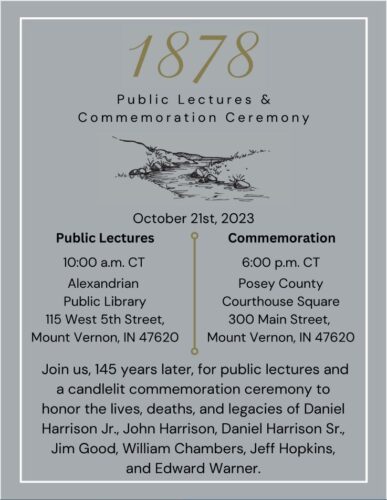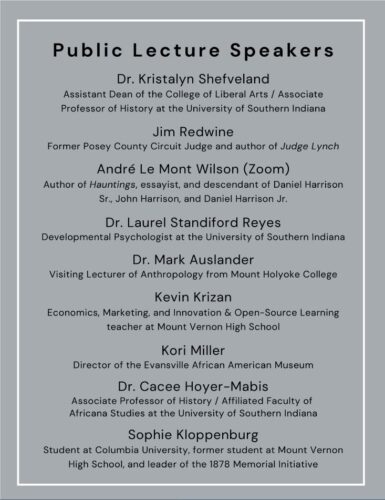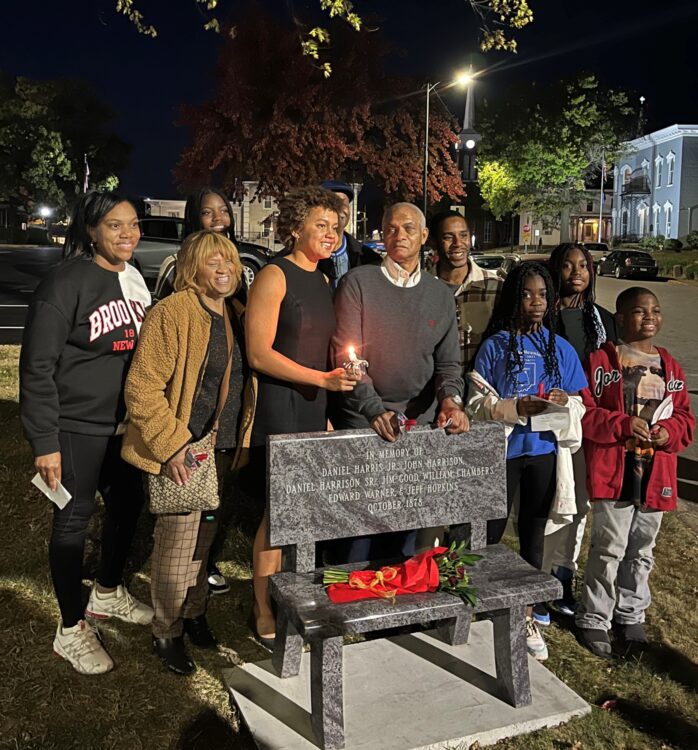One Year Later Sophie Kloppenburg Continues to Inspire
Share
Explore Our Galleries
Breaking News!
Today's news and culture by Black and other reporters in the Black and mainstream media.
Ways to Support ABHM?
Scholar-Griot: Samantha Humes, Attorney at Law
One year has passed since Sophie Kloppenburg and her supporters successfully installed a memorial bench and sign in October 2022 concerning the 1878 lynching of seven Black men in Posey County, Indiana. If you thought that was the end of this story, it was not. Because, one year later, Sophie continues to inspire. Ms. Kloppenburg spearheaded a collection of events in Mt. Vernon, Indiana on October 21, 2023. The day began with a series of public lectures at the Alexandrian Public Library in Mt. Vernon. It concluded that evening with a candlelight commemoration outside the Posey County Courthouse.
In putting this special day together, Sophie teaches us that the memorial was just one important step in addressing several overarching goals – to better understand our country’s difficult racial history, to identify ongoing and persistent systemic racism, and to support efforts in pursuing social justice. Addressing our country’s legacy of racial harm is an ongoing process. It requires continued and persistent effort. The scheduled events of October 21, 2023, were an acknowledgment of how essential it is to recognize this important work as an ongoing process.
Here is the invitation for the day’s event. The invitation lists nine impressive speakers. A tenth speaker named Diana Daniels was later added to the agenda. The invitation also lists a short description of each individual person, thus highlighting each person’s special contribution to the discussions for the day.


Additionally, here is a photo of Sophie Kloppenburg at the evening’s candlelight commemoration. She is photographed alongside members of the Bond Family, all descendants of Jim Good who was one of the seven men murdered in 1878.

Candlelight Commemoration October 21, 2023. Photo taken by Dr. Mark Auslander and provided to Samantha Humes by Dr. Kristalyn Shefveland.
I was able to participate virtually on October 21st and listen to the entire public lecture series. Here is a list of some of the important messages and topics highlighted by each speaker:
- Dr. Kristalyn Shefveland of the University of Southern Indiana provided the audience with a valuable history lesson concerning the 13th, 14th and 15th Amendments. She covered topics such as Reconstruction, white supremacy, sundown towns, and racial terror in general and specific to the State of Indiana.
- Jim Redwine discussed his connection to Posey County as a prior Posey County Circuit Court Judge and his book Judge Lynch! He spoke passionately of the need to do more than “wringing our hands at evil.” He emphasized it was important to atone for the past, to attend lecture series like this one, and to find ways to eliminate systemic prejudice.
- André Le Mont Wilson provided the unique perspective of being the descendant of three of the men lynched in Posey County in 1878 – Daniel Harrison Sr., John Harrison, and Daniel Harrison, Jr. Interestingly, he discussed that the often reported account of what happened to Mr. Harrison, Sr.’s body doesn’t match with the family’s shared understanding of this same history. He has written a collection of essays about his family’s history in a book called Hauntings. His book can be found at Newfound Publishing, a non-profit publishing company, here: https://newfound.org/shop/andre-le-mont-wilson-hauntings-print-e-book-copy/.
- Dr. Laurel Standiford Reyes of the University of Southern Indiana spoke from her area of expertise in the field of psychology. She outlined racial disparities in maternal and infant mortality rates and in how children are disproportionately disciplined in schools. Mass incarceration, restorative justice, bias in healthcare, addressing the fear of a multi-racial and multi-cultural society, and creating anti-racist frameworks for change were just some of the insightful topics covered.
- Dr. Mark Auslander is a sociocultural and historical anthropologist and currently a visiting lecturer at Mount Holyoke College in Massachusetts. Dr. Auslander spoke of the history of lynching photos and their use as tools of racial terror. He discussed his work with descendants of victims of racial violence. He talked about how tools of genealogical research aid his work and unlock the history of many such families. He stressed the importance that descendants should be involved in how history is documented and shared. For example, he outlined recent successful efforts to have Emory University add the names of the four men - Jeff Hopkins, Edward Warner, William Chambers and Jim Good- alongside to the Posey County 1878 lynching photo. It was the wish of the ancestor community that these men be honored and recognized in this way by name with the photo.
- Kevin Krizan was Sophie Kloppenburg’s teacher and mentor at Mt. Vernon High School. It was through a unique class he teaches that her project of the memorial came into being. He discussed how the class requires students to develop a project with the goals of developing leadership and communication skills, of learning from failure, of having passion for an idea, of the value of learning something new, and of helping someone other than yourself.
- Kori Miller, the Director of the Evansville African American Museum in Evansville, Indiana spoke about his museum’s history and the future goals of the museum. Director Miller emphasized the importance of Black history, especially the history often overlooked in textbooks. He also discussed the power of sharing and celebrating examples throughout history of Black accomplishment.
- Dr. Cacee Hoyer-Mabis is a professor of Africana Studies at the University of Southern Indiana. She discussed the role education needs to play in addressing racial injustice. Efforts to make sure Black history is an integral part of local education curriculum was highlighted, as well as the importance of not only sharing stories of injustice but stories of resilience and triumph.
- Sophie Kloppenburg served as the central organizer and host for the day’s events.
- Diana Daniels has a long and impressive history as an educator. She is also a direct descendant of one of the lynched men, Jim Good. Her current work on the Board of the Indiana Council of Educating Students of Color showcased her passion for increasing educational opportunities and success for students of color. She also discussed efforts to collect and preserve her family’s history, which is reflected in the existence of the Roberts, Thomas, Bonds Historical Society. She shared their efforts to both preserve and restore an African American settlement called “Little Africa” in Lick Creek located in Orange County, IN. She encouraged those in attendance to visit their website to learn more and join their efforts. You can find more information here: https://www.rtb1.org/.
This lecture series was an impressive collection of information and ideas. It was presented in a public forum for the benefit of anyone who wished to attend. The candlelight commemoration was an important way to continue to remember and acknowledge the murder of these seven men - Daniel Harrison, Sr., Daniel Harrison, Jr., John Harrison, Jim Good, William Chambers, Edward Warner, and Jeff Hopkins.
Simply put, Sophie Kloppenburg and her community have decided to roll up their sleeves and do the hard work – have an ongoing open and honest dialogue about the history of racism in this country. Once again, the messages are clear - It is unacceptable to just forget – AND the work to repair our country’s legacy of racial harm continues.
- To view the original story about Sophie Kloppenburg's efforts click "Finding Myself Inspired By A Modern Teenage Activist."
Samantha Humes is a graduate of Indiana University and the University of Wisconsin Law School. She has specialized in criminal defense for 20+ years, mostly representing the indigent. She most recently has expanded into immigration and Afghan asylum work. She calls Wisconsin home.









Comments Are Welcome
Note: We moderate submissions in order to create a space for meaningful dialogue, a space where museum visitors – adults and youth –– can exchange informed, thoughtful, and relevant comments that add value to our exhibits.
Racial slurs, personal attacks, obscenity, profanity, and SHOUTING do not meet the above standard. Such comments are posted in the exhibit Hateful Speech. Commercial promotions, impersonations, and incoherent comments likewise fail to meet our goals, so will not be posted. Submissions longer than 120 words will be shortened.
See our full Comments Policy here.